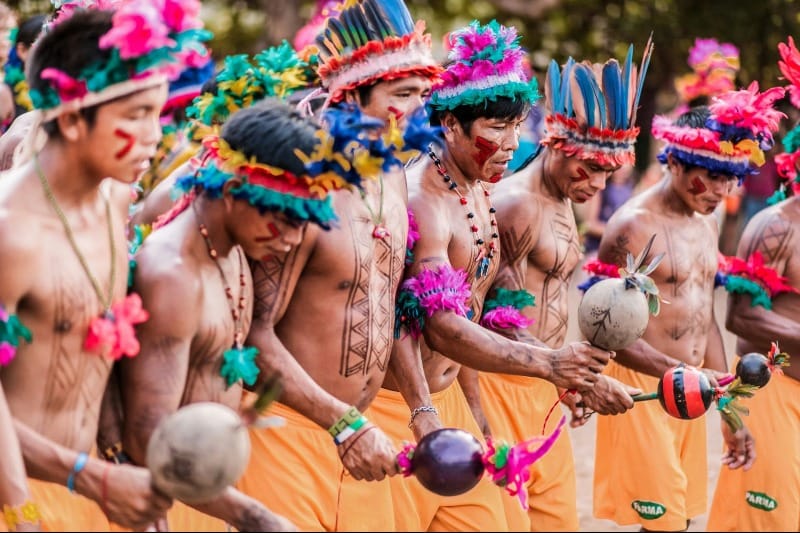In the heart of the Bolivian Amazon, a remarkable community is offering scientists invaluable insights into the secrets of healthy aging. The Tsimane people, an indigenous group living a traditional lifestyle, have captured the attention of researchers worldwide due to their exceptional heart health and longevity. This article explores the fascinating discoveries made about the Tsimane and what we can learn from their way of life to promote healthier aging in our modern world.
Key Takeaways:
- The Tsimane people have incredibly low rates of heart disease and slow brain aging.
- Their diet is high in fiber, lean proteins, and complex carbohydrates from natural sources.
- Physical activity is a constant part of their daily lives, contributing to their overall health.
- Low exposure to industrial pollutants may play a role in their health outcomes.
- Social connections and community support are integral to their lifestyle.
- Researchers believe studying the Tsimane could provide valuable insights for improving health in industrialized societies.
Who Are the Tsimane?
The Tsimane (pronounced chi-mah-nay) are an indigenous group of about 16,000 individuals living in the lowland rainforests of Bolivia. Their traditional way of life has remained largely unchanged for centuries, offering a unique window into how humans might have lived before the advent of modern industrialization[5].
The Tsimane Health and Life History Project
For over two decades, researchers have been studying the Tsimane through the Tsimane Health and Life History Project. This long-term study has provided a wealth of information about the health, lifestyle, and aging patterns of this remarkable community[2].
Extraordinary Heart Health
One of the most striking findings about the Tsimane is their exceptional cardiovascular health. Studies have shown that they have the lowest reported levels of coronary artery disease of any population ever studied[5].
Key Findings on Tsimane Heart Health:
- Nearly 9 out of 10 Tsimane adults aged 40-94 have clear arteries, showing no signs of heart disease.
- The average 80-year-old Tsimane has the same vascular age as an American in their mid-50s.
- Tsimane men and women have lower heart rates, blood pressure, cholesterol, and blood glucose levels compared to their Western counterparts[5].
Brain Aging and Cognitive Health
Recent research has also revealed that the Tsimane experience slower brain aging compared to people in industrialized societies[7].
Brain Aging Insights:
- The Tsimane's brains shrink about 70% slower than those in Western populations.
- This slower brain volume loss could explain why the Tsimane rarely experience dementia.
- Researchers believe that the Tsimane's lifestyle factors contribute significantly to their brain health[3].
The Tsimane Lifestyle: Keys to Healthy Aging
Several aspects of the Tsimane lifestyle have been identified as potential contributors to their remarkable health and longevity:
1. Diet
The Tsimane diet is vastly different from the typical Western diet and is believed to play a crucial role in their health outcomes[6].
Key Dietary Factors:
- High in fiber (about 100-150 grams per day, compared to the average American intake of 15-18 grams)
- Rich in complex carbohydrates from plantains, corn, cassava, and rice
- Includes lean proteins from fish and wild game
- Low in saturated fats and added sugars
- Minimal processed foods
2. Physical Activity
Physical activity is an integral part of daily life for the Tsimane, contributing significantly to their overall health[5].
Activity Patterns:
- Men are active for about 6-7 hours a day
- Women are active for about 4-6 hours a day
- Activities include hunting, gathering, fishing, and farming
3. Low Exposure to Industrial Pollutants
The Tsimane's remote location means they have minimal exposure to industrial pollutants and processed foods, which may contribute to their health outcomes[5].
4. Social Connections and Community Support
Strong social bonds and community support are hallmarks of Tsimane society, potentially contributing to their overall well-being and longevity[4].
Implications for Modern Societies
While it's not practical or desirable for most people in industrialized nations to adopt the Tsimane lifestyle entirely, there are valuable lessons we can learn:
- Increase Fiber Intake: Incorporating more high-fiber foods like fruits, vegetables, and whole grains into our diets could have significant health benefits.
- Prioritize Physical Activity: Finding ways to be more active throughout the day, rather than relying on short bursts of exercise, could improve overall health.
- Reduce Processed Foods: Limiting intake of processed foods and focusing on whole, natural foods could lead to better health outcomes.
- Foster Social Connections: Prioritizing community and social relationships may contribute to better mental and physical health.
- Minimize Exposure to Pollutants: While we can't completely avoid industrial pollutants, being mindful of our exposure and taking steps to reduce it where possible could be beneficial.
Challenges and Considerations
It's important to note that while the Tsimane enjoy excellent cardiovascular and brain health, they face other health challenges:
- Higher rates of infections due to limited access to modern healthcare
- Lower life expectancy (about 70 years) compared to industrialized nations, partly due to higher infant mortality rates
- Parasitic infections are common
These factors highlight the complexity of studying health across different populations and the need for a balanced approach when drawing conclusions[2].
Conclusion
The Tsimane people offer a fascinating glimpse into how lifestyle factors can influence health and aging. While we can't replicate their way of life exactly, there are valuable lessons we can learn and apply to our modern context. By incorporating some aspects of their diet, physical activity levels, and social structures, we may be able to improve our own health outcomes and potentially slow the aging process.
As research continues, the Tsimane will likely continue to provide valuable insights into human health and longevity. Their example serves as a powerful reminder of the profound impact our lifestyle choices can have on our long-term health and well-being.
Citations:
[1] https://www.ncbi.nlm.nih.gov/pmc/articles/PMC5421261/
[2] https://today.usc.edu/tsimane-moseten-brain-aging/
[3] https://academic.oup.com/psychsocgerontology/article/72/4/561/2632020
[4] https://evrimagaci.org/tpg/tsimane-community-offers-insights-on-slow-aging-26779
[5] https://lifespa.com/diet-detox/diet/amazonian-longevity-secret/
[6] https://gero.usc.edu/2021/05/26/tsimane-lifestyle-slow-brain-aging/













Member discussion